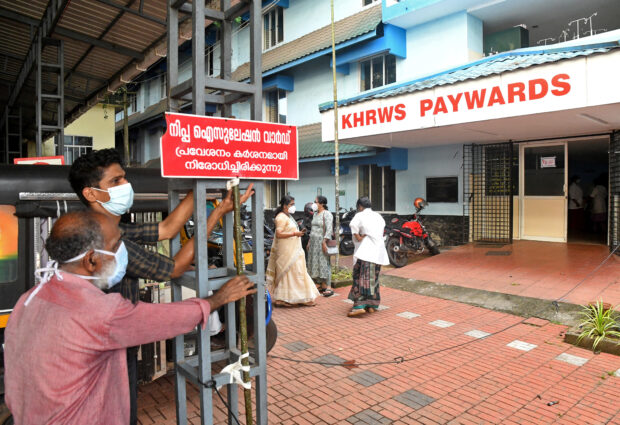
Staff members install a sign reading “Nipah isolation ward, entry strictly prohibited” at a hospital where a ward is being prepared for suspected Nipah virus patients in Kozhikode district, Kerala, India, September 12, 2023. REUTERS
NEW DELHI — Authorities closed down some schools and offices and declared more than seven villages as containment zones in the southern state of Kerala after it recorded two deaths from the rare and deadly brain-damaging Nipah virus.
One adult and one child are still infected and in hospital, and more than 130 people have so far been tested for the virus, which is transmitted to humans through direct contact with the bodily fluids of infected bats, pigs or other people, an official from Kerala’s health ministry said.
One person died this month while another death occurred on Aug. 30, while two more people from the same family, including one child, were the ones infected and in hospital.
Authorities declared containment zones in seven villages of the Kozhikode district, closing down schools, banks and other institutions.
Three teams from the federal government including the National Virology Institute were scheduled to arrive in Kerala on Wednesday for further testing, said the official who did not want to be quoted as he was not authorized to talk to the media.
The deadly brain-damaging Nipah virus was first identified in 1999 during an outbreak of illness affecting pig farmers and others in close contact with pigs in Malaysia and Singapore.
This is the fourth Nipah outbreak in Kerala since 2018. The first and worst outbreak began with a 26-year-old man who went to hospital with a fever and cough that spread to family members and other patients before it was diagnosed as Nipah.
READ: Medical teams sent to India amid deadly Nipah virus outbreak
Twenty one of the 23 infected people died then. In 2019 and 2021, Nipah claimed two more lives.
A Reuters investigation published in May identified parts of Kerala as among the places most at risk globally for outbreaks of bat viruses. Extensive deforestation and urbanization have brought people and wildlife into close contact.
RELATED STORIES